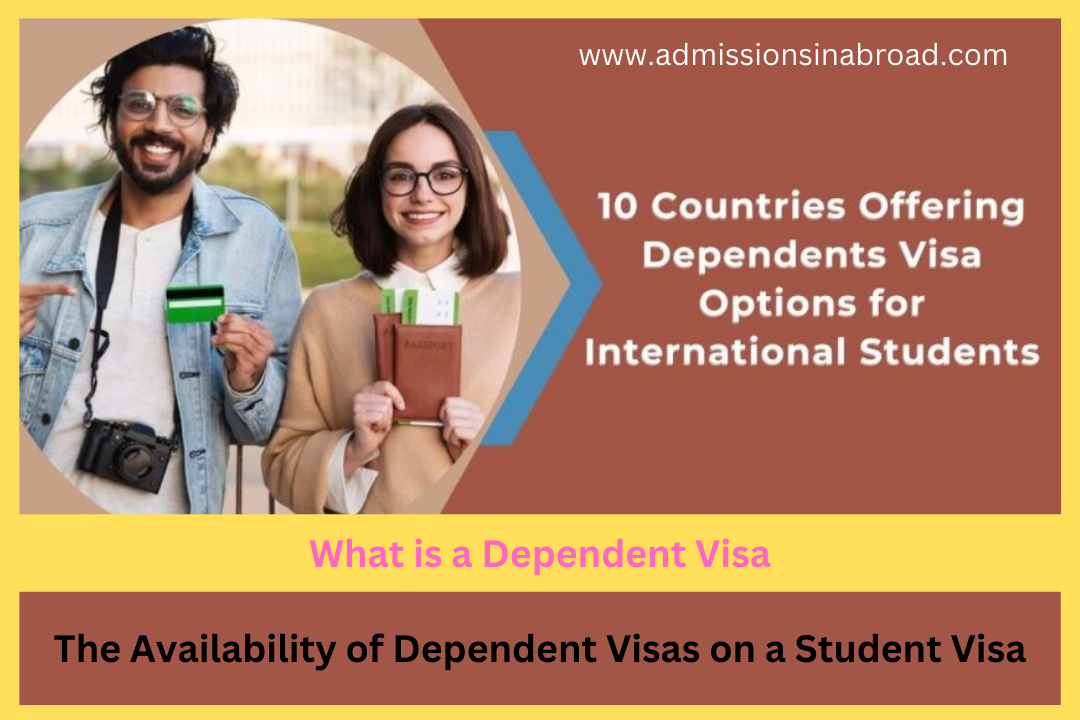Embarking on an international education journey is exciting but often involves the challenge of balancing family and studies. For students with spouses and children, the availability of dependent visas can be a deciding factor in choosing a study destination. Dependent visas allow family members to join the student during their studies abroad, providing emotional support and stability. However, the rules and benefits of dependent visas vary significantly across countries. Here is a comprehensive guide to understanding the dependent visa policies in major study destinations.
What is a Dependent Visa?
A dependent visa allows family members of a student visa holder to accompany them abroad. Typically, eligible dependents include:
- Spouse: Legal husband or wife of the student.
- Children: Unmarried children under a certain age (commonly 18 or 21, depending on the country).
Country-Specific Dependent Visa Policies
United States
- Visa Type: F-2 visa for dependents of F-1 visa holders.
- Eligibility: Available to the spouse and unmarried children under 21.
- Work Rights: F-2 visa holders cannot work in the U.S.
- Study Rights: Dependents can study part-time, but full-time study is not permitted except for minor children attending primary or secondary school.
- Financial Proof: Applicants must show sufficient funds to support dependents without relying on employment.
United Kingdom
- Visa Type: Dependent visa linked to the Student Visa (previously Tier 4).
- Eligibility:
- Postgraduate students studying a full-time course of at least 9 months.
- Certain government-sponsored programs.
- Work Rights: Dependents can work, with no restrictions on hours for most jobs.
- Study Rights: Children can attend state-funded schools.
- Financial Proof: A specific amount per dependent must be shown, varying based on the location (London vs. outside London).
Australia
- Visa Type: Student Dependent Visa (subclass 500).
- Eligibility: Dependents include spouses and children.
- Work Rights:
- Spouses can work up to 40 hours per fortnight during the student’s study term.
- Full-time work is allowed during study breaks.
- Study Rights: Children can enroll in local schools, but tuition fees may apply.
- Financial Proof: Evidence of sufficient funds for living expenses and tuition is mandatory.
Canada
- Visa Type: Spousal Open Work Permit and Study Permits for dependents.
- Eligibility: Spouses and dependent children can accompany international students.
- Work Rights:
- Spouses can apply for an open work permit, allowing them to work for any employer.
- Work rights are not restricted by specific hours.
- Study Rights: Children can study at Canadian schools without requiring a separate study permit.
- Financial Proof: Proof of sufficient funds to support dependents is required.
Germany
- Visa Type: Family Reunion Visa.
- Eligibility: Spouses and children under 16 years.
- Work Rights: Dependents are generally not allowed to work unless they acquire a separate work permit.
- Language Requirements: Spouses may need to demonstrate basic German language proficiency (A1 level).
- Study Rights: Children can attend school, often for free.
France
- Visa Type: Long-Stay Visitor Visa for Dependents.
- Eligibility: Dependents of students studying for more than 6 months.
- Work Rights:
- Spouses can work up to 20 hours per week.
- Study Rights: Children can enroll in local schools.
- Financial Proof: Proof of adequate income or savings to support dependents is required.
New Zealand
- Visa Type: Dependent Visa under Student Visa.
- Eligibility: Dependents of students pursuing postgraduate programs or certain long-term skill shortage courses.
- Work Rights:
- Spouses can apply for an open work permit.
- Study Rights: Children can attend school as domestic students.
- Financial Proof: Applicants must show evidence of sufficient financial resources.
Key Considerations When Applying for a Dependent Visa
- Eligibility:
Ensure the primary student visa holder meets the eligibility criteria to bring dependents, as some programs (e.g., short-term or undergraduate courses) may not qualify. - Financial Stability:
Almost all countries require proof of sufficient funds to support dependents during their stay. This includes living expenses, tuition (if applicable), and healthcare costs. - Health Insurance:
Dependents are often required to have health insurance coverage for the duration of their stay. - Immigration Rules and Policy Changes:
Immigration policies evolve over time. Always consult the official government or immigration website for the most accurate and updated information. - Cultural and Social Adaptation:
Ensure dependents are prepared for cultural differences and have access to resources that can help them adapt to the new environment.
Conclusion
Studying abroad is a life-changing experience, and having your family by your side can make it even more fulfilling. Dependent visas offer the opportunity to maintain family bonds while pursuing your academic dreams. By understanding the specific regulations of your destination country, you can plan effectively and ensure a smooth transition for you and your family.
FAQs on Dependent Visas for Student Visa Holders
- What is a dependent visa?
A dependent visa allows family members, such as spouses and children, to accompany a student visa holder during their studies abroad. - Who is eligible to apply for a dependent visa?
Typically, eligible dependents include:- Legal spouses.
- Unmarried children under a specified age (commonly 18 or 21, depending on the country).
- Can dependents work while on a dependent visa?
Work rights for dependents vary by country:- USA: F-2 dependents cannot work.
- UK: Dependents can work without restrictions.
- Australia: Spouses can work up to 40 hours per fortnight.
- Canada: Spouses can apply for an open work permit.
- Germany: Work rights are limited and require a separate permit.
- France: Spouses can work part-time (up to 20 hours per week).
- Can dependents study on a dependent visa?
- USA: Dependents can study part-time, with full-time study allowed for minor children.
- UK, Canada, and Australia: Children can attend local schools, and spouses may study.
- Germany and France: Children can enroll in schools, often free of charge.
- Do I need to show financial proof for my dependents?
Yes, most countries require proof of sufficient funds to support your dependents during their stay. This includes living expenses, tuition (if applicable), and healthcare costs. - What are the work restrictions for spouses on a dependent visa?
Work rights depend on the country:- Open work permits: Canada and New Zealand.
- Restricted work: Australia and France.
- No work rights: USA (F-2 visa).
- Are there language requirements for dependent visas?
Some countries, like Germany, may require spouses to demonstrate basic language proficiency, such as A1-level German. - Do dependents need health insurance?
Yes, health insurance is usually mandatory for dependents in most countries to cover medical expenses during their stay. - Can dependents stay after the student visa holder’s program ends?
In most cases, dependents must leave the country when the student visa holder’s visa expires unless they qualify for another visa category. - Which countries allow dependent visas for undergraduate students?
Generally, countries like the USA, UK, and Canada restrict dependent visas to postgraduate students or students enrolled in long-term programs. Always check specific country policies for details. - Can I bring dependents if I’m enrolled in a short-term course?
In most countries, dependent visas are not available for students enrolled in short-term or non-degree programs. - How do I apply for a dependent visa?
Applications are typically submitted alongside or after the student visa application. Requirements include:
- Proof of relationship (marriage or birth certificate).
- Evidence of financial stability.
- Health insurance documentation.
- Do dependents face any restrictions while living abroad?
Restrictions vary by country. For example:
- Employment restrictions (e.g., USA).
- Limited study rights for spouses (e.g., USA and Australia).
- Financial and language requirements in countries like Germany.
- Can dependents work full-time during the student’s holidays?
In countries like Australia and New Zealand, dependents may have fewer restrictions on work during academic breaks. - What should I consider before applying for a dependent visa?
Key factors include:
- Financial stability.
- Health insurance.
- Immigration policy changes.
- Adapting to cultural and social environments in the destination country.
- Can dependents apply for permanent residency later?
In some countries, dependents may transition to permanent residency if the primary visa holder meets specific criteria (e.g., Canada and New Zealand).
SOP for Dependent Visa: A Comprehensive Guide
A Statement of Purpose (SOP) for a dependent visa is a vital document that explains the applicant’s relationship with the primary visa holder and the reasons for joining them in a foreign country. Whether it is for a spouse, children, or dependent parents, the SOP serves as a personal letter to the immigration authorities, presenting your case for approval.
This guide will help you understand how to write an effective SOP for a dependent visa, the common requirements, and tips for success.
Purpose of the SOP for Dependent Visa
The SOP aims to:
- Demonstrate Genuine Intentions: Convince visa officers of your legitimate reasons for joining the primary visa holder.
- Provide Relationship Proof: Establish your relationship with the sponsor (spouse, parent, or child).
- Highlight Financial Stability: Show that the primary visa holder or yourself can support the dependent’s stay financially.
- Show Compliance with Immigration Laws: Assure authorities that you will follow all visa regulations, including returning to your home country if required.
Types of Dependent Visas
- Temporary Dependent Visa
- For short-term stays.
- Typically linked to student, work, or visitor visas.
- Permanent Dependent Visa
- For long-term or indefinite stays.
- Common for dependents of permanent residents or citizens.
Format of an SOP for Dependent Visa
The SOP should follow a professional and structured format:
1. Introduction
- Start with a clear statement of your purpose.
- Mention your relationship with the primary visa holder.
- Provide a brief overview of your reason for applying.
2. Background Information
- Describe your personal and professional background.
- Include details about your family and relationship with the primary visa holder.
- Highlight your ties to your home country (property, family, job, etc.) if applicable.
3. Purpose of Visit
- Clearly explain why you want to join the primary visa holder.
- Include details of the sponsor’s current status (work visa, student visa, etc.).
- Highlight emotional and practical reasons, such as supporting your spouse or children.
4. Financial Capability
- Detail the sponsor’s financial ability to support your stay.
- Include proof of income, savings, or sponsorship letters.
- If applicable, explain your own financial contributions.
5. Compliance with Immigration Laws
- Assure the visa officer that you understand and will abide by the visa conditions.
- State your intention to leave the country if the visa conditions require it.
6. Conclusion
- Reiterate your reasons for applying.
- Express gratitude for the opportunity to submit the application.
- End with a polite and positive note, emphasizing your commitment to follow the rules.
Tips for Writing an Effective SOP for Dependent Visa
- Be Honest and Clear: Avoid exaggeration or providing false information.
- Personalize the SOP: Tailor the content to your specific case and the country’s visa guidelines.
- Use a Professional Tone: Keep the language formal and respectful.
- Highlight Key Documents: Mention the documents you are submitting as proof, such as marriage certificates, birth certificates, or sponsorship letters.
- Keep it Concise: Ensure the SOP is precise and to the point, ideally within 1-2 pages.
- Proofread Thoroughly: Check for grammatical errors, spelling mistakes, and consistency.
Common Mistakes to Avoid
- Generic Content: Avoid copying templates or using generic phrases.
- Irrelevant Details: Focus only on information relevant to the visa application.
- Lack of Supporting Evidence: Back every claim with proper documentation.
- Failure to Address Key Points: Ensure you explain financial stability, genuine intent, and compliance with laws.
Sample SOP for Dependent Visa
Subject: Application for Dependent Visa
Dear Visa Officer,
I am writing to apply for a dependent visa to join my [spouse/parent/child], [Name], who is currently residing in [Country] on a valid [visa type]. As [relation], it is my sincere wish to be with my family and provide the necessary emotional and practical support during their stay.
I have been married to [Name] for [duration] and share a strong bond with them. [Provide additional details about your relationship.] My spouse is currently employed/studying at [institution/company], and I believe that my presence would contribute significantly to their well-being and success.
[Include details about financial support, compliance with immigration laws, and other relevant information.]
I sincerely hope you will consider my application favorably. Thank you for taking the time to review my case.
Yours faithfully,





